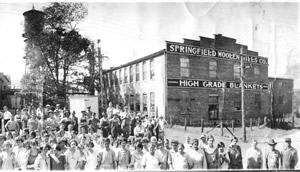Industry

From the earliest days, Tennessee’s inhabitants drew upon its natural resources, using hand labor to craft tools and necessities. The wealth of timber, stone, and running water made good farm sites. Veins of red iron ore in East Tennessee and brown iron ore on the Western Highland Rim meant early forges and furnaces. Owners grew wealthy through the skilled labor of immigrants from Wales, Ireland, Scotland, England and Germany, and free and enslaved African Americans. After Emancipation, many of the formerly enslaved continued in the industry. Their descendants can be found in Dickson, Stewart, and Montgomery counties today. By the late 1830s, marble was a business in Hawkins County. Copper was discovered near the Ocoee River in 1843, and zinc was being mined in Jefferson County by the early 1850s. Tennessee’s second state geologist, James Safford, promoted the rich deposits of phosphate in Maury County’s Mount Pleasant community in the 1890s. Phosphate would prove valuable for war munitions during World War I and crop fertilizers thereafter.
Frontier homesteaders had the skills to make liquor, brandy, and other alcoholic beverages from their grains and fruit. By 1860, distilled spirits were also produced in commercial quantities in a few counties. Robertson County, in the prime tobacco growing section of the state, was a major center of production, with twenty-six establishments. While most operators of Robertson County distilleries hailed originally from Scotland, England and Ireland, Nashville Germans were responsible for two of Tennessee’s prominent whiskey brands. The Springfield industry was shuttered by local vote in 1903. The Springfield woolen mill, opened in an attempt to replace the distilling industry, supplied blankets for railroad Pullman cars and blankets to outfit the U.S. Army and Navy during two world wars.
Tobacco, one of Tennessee’s primary cash crops before the Civil War, rose to even greater prosperity in the decades afterwards. Montgomery and Robertson Counties and neighboring Kentucky counties formed the “Black Patch,” which produced dark fired (barn smoked) tobacco. Clarksville and Springfield had a number of tobacco warehouses, “loose floors” where tobacco auctions took place, and packing and shipping jobbers. A populist uprising known as the Black Patch War took place in the early 1900s, with tobacco growers attempting to break the monopoly of the American Tobacco Company. While the protests erupted into murder and mayhem, and much was lost in vigilante violence, the growers ultimately won, forcing the company to dismantle at least a part of its enterprise.
While all of these industries would continue to grow into major profit centers for Tennessee, the most widespread manufacturing statewide, from the earliest days into the 1920s was sawed lumber, with at least one establishment in every county and more in heavily forested sections. Logging ultimately turned large swaths of land over to public use. In the Townsend section of the Great Smoky Mountains National Park one can see the remnants of the Little River Lumber Company. The former holdings of Hillman Iron and Lumber in make up a large part of the Land Between the Lakes National Recreation Area, and much of the Cumberland Plateau is in conservation since the exit of commercial loggers.
The biggest change agent of all was the Tennessee Valley Authority. Once the agency took control of hydroelectric production, Tennessee’s industrial landscape was forever changed. Manufacturers seeking cheap electricity, open land on which to build a plant, and a willing work force began to come into the state, regardless of the natural resources under their feet.